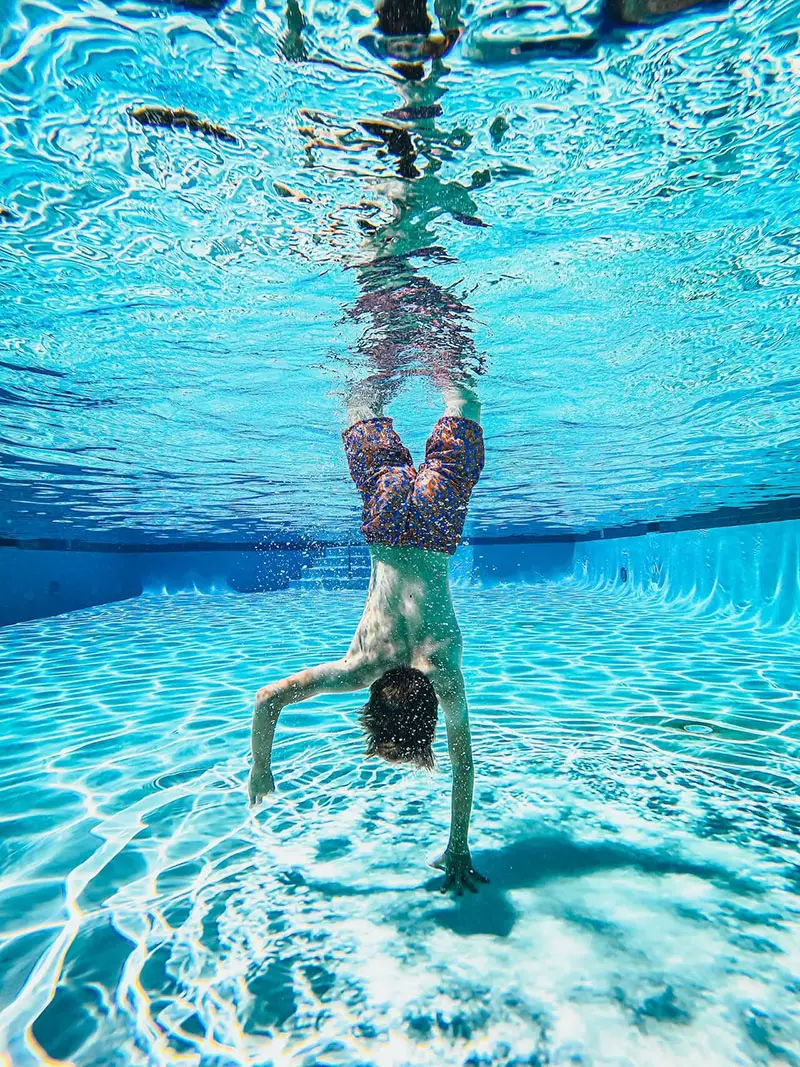Many people believe that swimming can make you taller, and it’s a popular topic of discussion among fitness enthusiasts and swimmers alike.
This idea takes root in the fact that swimmers are typically known to have lean and tall physiques, leading to the assumption that the activity itself influences height growth.
However, the question remains: Can swimming actually make someone taller or is it simply a myth?
Swimming won’t make you taller or shorter. Though it can give you a temporary height boost through better posture and spinal decompression, your genes and growth hormones are the main determinants when it comes to your height, assuming you are eating and sleeping enough.
Swimming can help with overall growth and development, especially during puberty, by improving flexibility, posture, and physical development. But, there’s not much evidence to back up the idea that swimming can make you taller. To reach your full growth potential, eat a balanced diet, get enough sleep, and include regular physical activities like swimming.
In this article, we will explore the relationship between swimming and height and dive into the available research on this topic, to provide you with accurate insight on whether or not swimming can contribute to an increase in height.
Understanding Height Growth

When discussing whether swimming can make you taller, it’s essential to understand the fundamental factors that influence height growth. In this section, we’ll explore genetics, growth plates, and hormones.
Genetics and Growth
Our height is primarily determined by our genetic makeup. According to a study published in Scientific Reports, genetic factors significantly affect height variance in adolescence and early adulthood. While certain lifestyle choices, nutrition, and physical activities may help you reach your maximum height potential, your genetics play the most crucial role in determining your height.
Growth Plates and Hormones
Growth plates, found at the end of our long bones, are responsible for bone growth during childhood and adolescence. These plates close after puberty, usually around age 13-15 for girls and 15-17 for boys. After that, significant height increase becomes nearly impossible.
Human growth hormone (HGH) is another crucial element influencing our height growth. Released by the pituitary gland, HGH stimulates the growth of bones, cartilage, and other tissues. Certain activities, such as regular exercise and getting enough sleep, can help boost HGH production in the body.
In conclusion, swimming might have a minimal impact on height growth through posture improvement and spinal stretching. However, genetics and growth hormone levels are the major factors in determining an individual’s height. Swimming and other forms of exercise can contribute to a healthy lifestyle, which may help you reach your genetic growth potential, but they won’t magically make you taller.
Swimming and Its Impact on Height

Effects on Spine and Posture
Swimming is known to temporarily increase the appearance of height by reducing the force of gravity on your spine, allowing it to relax and decompress (HealthCentral). This results in an improved posture and a slightly taller appearance, making swimming one of the best low-impact exercises for spinal health.
Full Body Exercise
Swimming is a full-body exercise that engages all major muscle groups, which can contribute to overall growth and development. While it may not directly lead to an increase in height, swimming helps build a well-proportioned and lean physique, creating an illusion of a taller appearance.
Furthermore, the act of swimming encourages the release of growth hormones that are essential for growth and development during adolescence (PDF Source). Hence, incorporating swimming into a regular fitness routine can support overall growth in younger individuals.
Flexibility
Swimming calls for a high level of flexibility (and can make you more flexible), as it requires the swimmer to continually stretch their spine, limbs, and joints during each stroke. This consistent stretching can lead to an increased range of motion and improved flexibility, which contributes to a more elongated and aligned physique.
Overall, while swimming may not directly cause a significant increase in height, it can result in a taller appearance through improved posture, a leaner physique, and enhanced flexibility.
Does Swimming Make You Taller During Puberty?

During puberty, swimming may have a temporary influence on a person’s height. The growth hormone levels in the body increase during this period, and swimming could contribute to a minor increase in height from decompression of the spine. This effect, however, is only temporary.
While it is a common belief that swimming can help you grow taller, solid evidence supporting this idea is limited. Still, some experts argue that swimming can contribute to height growth in a way, particularly since it enhances flexibility, posture, and overall physical development.
Swimming is a sport that can benefit various aspects of physical health, such as muscle strength, cardiovascular fitness, and joint mobility.
Although it may not have a significant impact on height, it is essential to remember that engaging in regular physical activities can promote overall health and well-being. The primary focus should be on enjoying the benefits and joy swimming provides rather than solely aiming for height gain.
Does Swimming Make You Shorter?
While some people wonder if swimming can make you taller, others might be concerned about the possibility of it making you shorter. The good news is that swimming does not cause shrinkage in height. In fact, swimming has numerous benefits for your overall health and well-being, but changes in height are not among them.
As mentioned above, the spine decompresses during swimming due to the lack of gravitational force. While this may create a slight temporary elongation of the spine, it does not result in any permanent change to your height.
Similarly, this temporary elongation and decompression do not lead to becoming shorter either; you go back to the height that you should be at normally with gravity pressing down on you.
Swimming strengthens and tones various muscle groups throughout the body, which could improve posture and make you appear taller or more elongated. However, this is not due to a change in skeletal structure, nor does it indicate that swimming can cause the body to shrink or lose height once gravity does its thing.
To summarize, despite popular misconceptions, swimming does not make individuals taller or shorter. Instead, it provides an excellent form of cardiovascular exercise, with numerous health benefits and improvements in muscle tone and flexibility, without any significant impact on one’s height.
Other Factors That Influence Height

Swimming can have an impact on height, but there are other crucial factors that contribute to a person’s overall growth. Let’s discuss them in more detail.
Nutrition and Diet
Nutrition plays a significant role in an individual’s height. A well-balanced diet rich in the right nutrients can promote growth and overall health. Some important nutrients for height include:
- Protein: Crucial for muscle growth and cell regeneration. Found in foods such as meat, fish, eggs, and legumes.
- Calcium: Essential for strong bones and teeth. Found in foods like dairy products, leafy greens, and nuts.
- Vitamins: Different vitamins play different roles in growth. For example, vitamin D helps with calcium absorption, while vitamin A contributes to bone growth.
Adopting a healthy and well-balanced diet is an essential step for anyone looking to optimize their growth potential.
Sleep and Growth Hormones
Another important factor in height growth is the quality and duration of sleep. It is during sleep that the body releases human growth hormone (HGH), stimulating cell regeneration and growth in various organs, including bones.
Therefore, getting enough sleep is crucial for height development. It’s generally recommended that teens and pre-teens get 8-10 hours of sleep per night, and adolescents get 9-12 hours of sleep per night to support their growth and overall well-being.
It is essential to consider these factors, along with the possible implications of swimming, when looking to maximize a person’s height growth.

